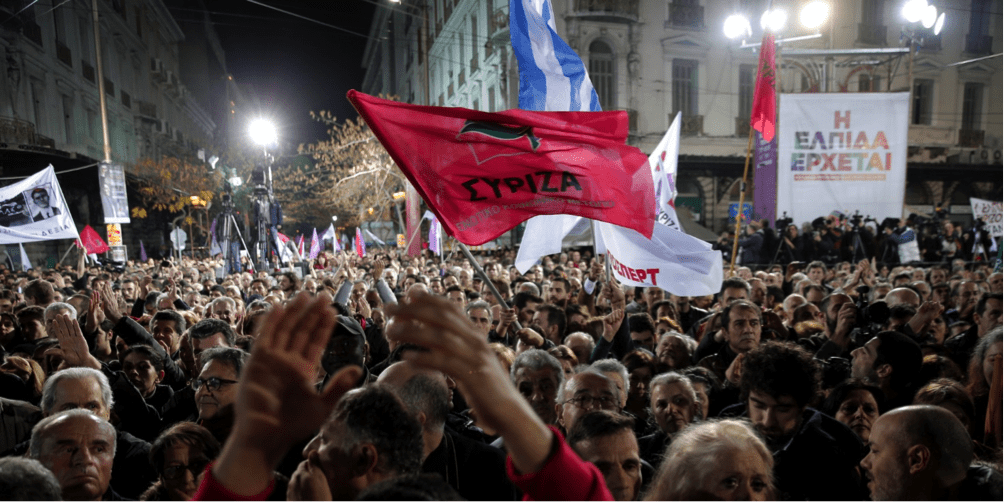 by Colin Fox
by Colin Fox
The pollsters got it wrong again. Those who predicted Greece would vote ‘Yes’ to austerity ended up with feta on their face. And those who concluded it was ‘too close to call’ were out too. In the end it wasn’t even close, as the ‘No’ to austerity or ‘OXI’ [pronounced ‘Ochi’] campaign won by 61% to 39%. These figures do not make clear that it was those young, unemployed and penniless Greeks who don’t usually vote who responded most decisively to Alexis Tsipras’s call for ‘courage’ and ‘rejection of further austerity’.
Now that the dust has settled on Sunday’s result the magnitude of what Greece has done is startling. Where else in the world has a small country like Greece [population 11million] stood up so defiantly and repeatedly to the most powerful institutions in the world? Who else has shown such strength in the face of such an overwhelming power imbalance? The Greek people have in effect walked up to the International Monetary Fund, The European Central Bank and the European Union, looked them in the eye and said ‘OXI’! ‘No. We will not accept the terms laid down by you in return for this latest bail-out loan’.
 Faced with a banking crisis so profound they could only access €60 ‘pocket money’ on a daily basis and with threats of political, financial and economic ‘Armageddon’ raining down upon them from Angela Merkel, Francois Hollande and Martin Schultz of the European Parliament who warned their ‘children will not eat’ if they vote No, they stood firm. Previous Greek Governments all cowered in the face of such ECB dictats.
Faced with a banking crisis so profound they could only access €60 ‘pocket money’ on a daily basis and with threats of political, financial and economic ‘Armageddon’ raining down upon them from Angela Merkel, Francois Hollande and Martin Schultz of the European Parliament who warned their ‘children will not eat’ if they vote No, they stood firm. Previous Greek Governments all cowered in the face of such ECB dictats.
This astonishing Greek defiance is rooted in its material circumstances. When I was in Athens in January there was no enforced bank holiday. The economic situation has gotten worse. The widespread impoverishment I witnessed with rough sleepers on every street, boarded up shops in their thousands, tens of thousands of young Athenians with nothing to do, has deteriorated further. Greece has even bigger un-payable debts now. At €340bn they represent 180% of its annual GDP, the second highest in the world, only Chad is worse. Pensioners struggle to keep three generations of their family together on a paltry retirement income. The policies imposed by the Troika – crippling austerity, privatisation, cuts in public spending and debt repayments – have failed comprehensively. The Greece people reached that conclusion a long time ago.
Syriza won this extraordinary referendum, called within a week, despite not fulfilling a single one of its 7 point election manifesto [‘Thessaloniki Declaration]. Yet they remain popular because in their defiance they restored Greek pride. Had they lost Sunday’s referendum Alexis Tsipras would have resigned and so would his Government. For they made it clear they would not implement further austerity and suffering on the Greek people. ‘Let someone else make the cuts. We refuse.’ That was their message and there is honour in that.
 With this renewed mandate Syriza is prepared to compromise. The resignation of Finance Minister Yanis Varoufakis is meant to be an olive branch held out to the ‘European Institutions’. It is in recognition of the Troika’s disdain for his style. Syriza expect them to reciprocate with concessions of their own when negotiations resume on the deal rejected last week in Brussels.
With this renewed mandate Syriza is prepared to compromise. The resignation of Finance Minister Yanis Varoufakis is meant to be an olive branch held out to the ‘European Institutions’. It is in recognition of the Troika’s disdain for his style. Syriza expect them to reciprocate with concessions of their own when negotiations resume on the deal rejected last week in Brussels.
So what happens now? I expect negotiations between Syriza and the ‘Troika’ to begin immediately with emergency ECB liquidity restored to the Greek banks. Greece is not out of the woods yet, not by a long way, and yet in due course I expect agreement to be reached on writing off unpayable Greek debts because that is the pragmatic solution. And since neither side wish to leave the Eurozone I expect mutual self-preservation to prevail.
